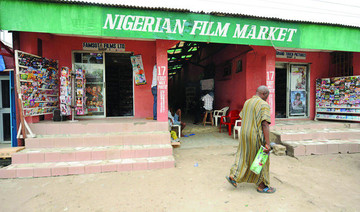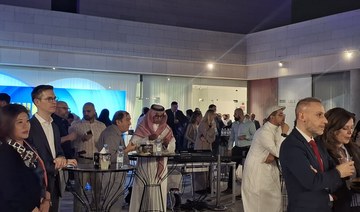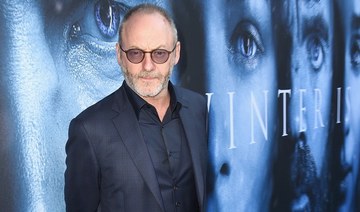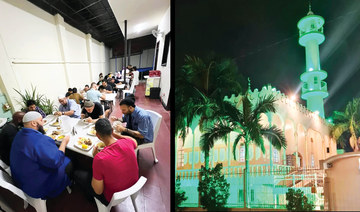LAGOS, Nigeria: A glamor blogger, a filmmaker and a tech mogul are competing to create a homegrown African rival to Netflix, but poor Internet connections and intense competition are proving daunting obstacles.
They dream of popularizing access to films made in Nigeria, which is home to the world’s second biggest movie industry in terms of production behind Hindi-language Bollywood.
With nearly $4 billion in revenue and almost 2,000 productions every year, films made in what is known as Nollywood are largely sold on the streets and to idling motorists caught in traffic as pirated copies for just a few dollars.
Local start-ups and Nollywood stars understand the interest in changing the distribution of films that are hugely popular across Africa, where cinemas are few and far between.
With such a huge potential market, video-on-demand platforms have sprung up in Lagos, Nigeria’s commercial capital and home to the country’s film industry.
And competition is already fierce.
Blogger Linda Ikeji — one of Nigeria’s biggest names on social networks — recently launched Linda Ikeji TV (LITV) to great fanfare.
It offers dozens of films, series and programs inspired by US shows but with a Nollywood twist for a monthly fee of 1,000 naira ($2.80).
“We are hoping to be to Africa what Netflix is to the world,” Ikeji wrote on her Instagram page, which has some two million followers.
She promised glamor, sass and humor, particularly with reality shows such as “Football Wives” or “Highway Girls of Eko,” “a show on real-life prostitutes” in Lagos.
The 37-year-old former model-turned-businesswoman made her fortune through advertising revenue on her site, which tracked the lives of Nigeria’s rich and famous.
She said she had invested “half-a-billion naira” of capital in the project. As well as buying video, she is also making original content from her own studios in Lagos.
Before the end of the year, Nigerian company Envivo is expected to launch its own platform with an initial investment of more than $20 million, said filmmaker Chioma Ude, who is the firm’s marketing director.
“(US telecoms giant) Cisco wants a big footprint in Africa, and as our technical partner, they will provide all the technology, from the network to the video compressions, etc.,” the founder of the Africa International Film Festival said.
A viable economic model for the promoters of Nollywood online still needs to be found, given the lack of widespread high-speed Internet coverage.
Only 34 percent of Africans have Internet access compared with more than 50 percent in the rest of the world, according to the 2018 Global Digital report.
But Africa showed the biggest progression in Internet users last year, especially through mobile telephones.
Serge Noukoue, organizer of the annual Nollywood Week in Paris, said price was everything and the African consumer wanted to pay “as little as possible” to watch a film.
“Even iROKOtv, the pioneer on the continent, doesn’t really make a profit,” he said.
“They have had a lot of success in fundraising but what subscribers actually bring in is less conclusive.”
Jason Njoku founded iROKOtv in 2010 but said he made a mistake to count on streaming from the start. “It simply couldn’t work,” he explained.
“Data costs were prohibitive, as is access to reliable broadband across huge swathes of the continent. Our customer service team was inundated with queries.
“We totally rebuilt our product and rebuilt our entire company around the African consumer and their habits.”
That led to an application that ate less data and which allows free mobile downloads of video files.
There is original content, while films have also been subtitled in French, Swahili and Zulu to make them more accessible to other African countries.
Competitors have emerged elsewhere in Africa in recent years, including Kenya’s BuniTV ($5-a-month) or South Africa’s Magic Go ($8-a-month).
“If these online platforms don’t make money yet they’re a bet on the future for when connections are better,” said Noukoue.
“A lot of projects have been created but there will not be room for everyone in the market in the long term. Competition will be fierce.”
Giants of the sector such as Netflix, which in 2016 launched in Africa, could outshine the continent’s video-on-demand pioneers in years to come.
“Netflix doesn’t yet have a real Africa strategy but it’s started to produce original African content. That will be a gamechanger.
“It has considerable means at its disposal that the others don’t have.”
Nigeria sees a rush to get Nollywood online
Nigeria sees a rush to get Nollywood online
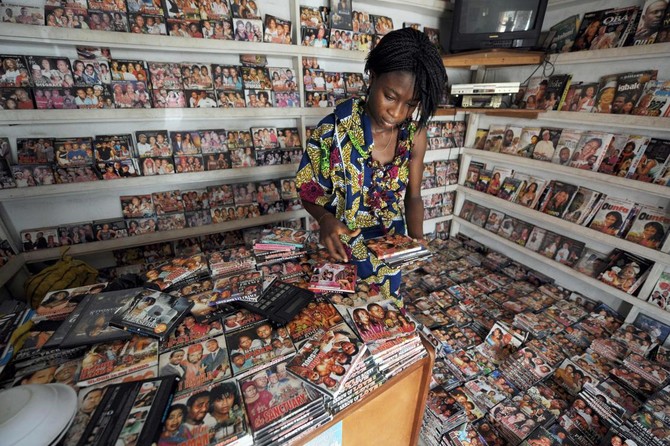
- Nollywood is home to the world’s second biggest movie industry in terms of production behind Hindi-language Bollywood.
- A viable economic model for the promoters of Nollywood online still needs to be found, given the lack of widespread high-speed Internet coverage
Muse to perform in Abu Dhabi this year
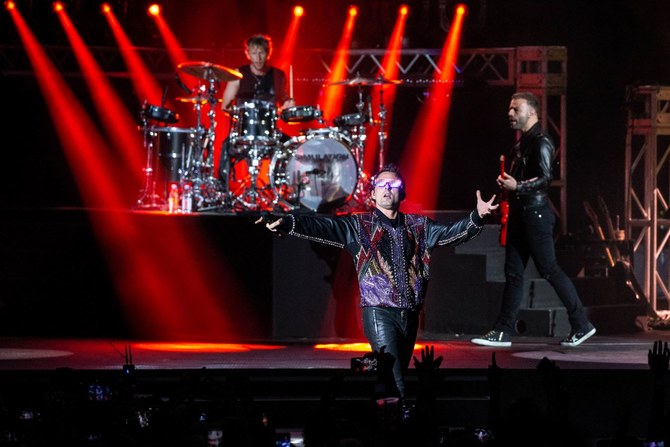
DUBAI: British rock veterans Muse are headed to Abu Dhabi for the second time as they get ready to perform at the 2024 Etihad Airways Abu Dhabi Grand Prix after-party concert series.
Running from Dec. 5 - 8, Muse is the first the band to be announced as part of the concert series. Access to all concerts is exclusive for Abu Dhabi F1 Grand Prix ticket holders.
“Catch the Grammy Award winning rock icons electrifying the stage at @etihadpark this December at the #F1Finale Yasalam After-Race Concerts,” read a social media post on the official Instagram account of Abu Dhabu Grand Prix.
A date has not yet been announced for the concert.
This is the second time the “Starlight” rockers are performing as part of the concert series, having made their debut in the UAE capital in 2013.
Music ‘haven of freedom’ Tangiers hosts global jazz festival
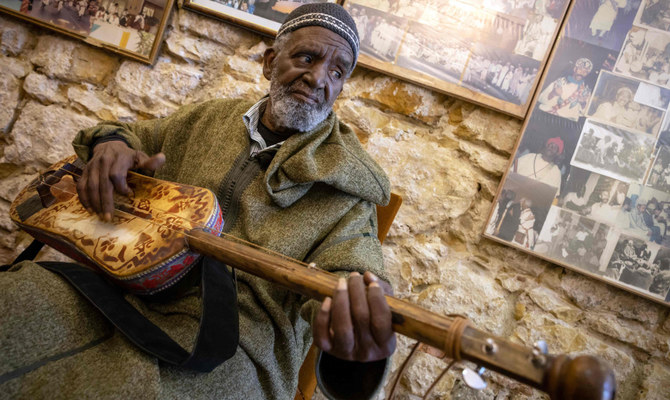
- This year’s Jazz Day will be held over four days starting on Saturday, during which talks and open-air performances will be held in Tangiers
TANGIERS, Morocco: The Moroccan city of Tangiers, which has a long history as a haven of inspiration for American jazz musicians, will host UNESCO’s International Jazz Day for the first time on Tuesday.
Over the last century, jazz greats such as Randy Weston, Idrees Sulieman and Max Roach all crossed the Atlantic to play and record music in the North African port city, perched on the edge of the Strait of Gibraltar.
“The city has had a fascinating power of attraction on a wave of intellectuals and musicians,” Philippe Lorin, the founder of an annual Tangiers jazz festival, told AFP.
“It’s not for nothing that a writer once said there was always a cruise liner in New York preparing to sail for Tangiers.”
This year’s Jazz Day will be held over four days starting on Saturday, during which talks and open-air performances will be held in Tangiers.
The festivities will culminate in an “All-Star Global Concert” on Tuesday led by jazz icon Herbie Hancock, also featuring bassists Marcus Miller and Richard Bona, as well as guitarist Romero Lubambo.
The city’s cosmopolitan artistic reputation stems from its location between Africa and Europe as well as its history, having been administered by several colonial powers from 1923 to 1956, the year Morocco gained independence.
This melting pot of influences prompted visits from international writers and poets, notably from the Beat Generation movement, as well as African American musicians seeking to find “their African roots,” Moroccan historian Farid Bahri told AFP.
Lorin said that Tangiers “was a haven of freedom — just like jazz music.”
A pivotal moment in the city’s musical history came in 1959, when Tangiers jazz promoter Jacques Muyal — then just a teenager — recorded a session with trumpeter Idrees Sulieman, pianist Oscar Dennard, bassist Jamil Nasser and drummer Buster Smith at the Radio Tanger International studio.
The recording gained renown in jazz circles decades before its distribution as “The 4 American Jazzmen In Tangier” album in 2017.
Bahri, the author of “Tangiers, a world history of Morocco,” said “the presence of American musicians in Tangiers was also linked to a very active American diplomacy.”
Famous US pianist Randy Weston settled in Tangiers for five years after visiting 14 African countries in 1967 during a tour organized by the US State Department.
The Brooklynite virtuoso would play a key role in building the musical reputation of the city, to which he dedicated his 1973 album “Tanjah.”
“Randy was an exceptional, kind and respectful man,” said Abdellah El Gourd, a 77-year-old Moroccan legend of gnawa music, a centuries-old style played with a three-stringed lute and steel castanets, rooted in West African rituals and Sufi traditions.
“He gave a lot to the city and its musicians,” added the friend and collaborator of Weston, who died in 2018.
Together, El Gourd and Weston blurred the lines of their respective genres, creating the beginnings of jazz-gnawa fusion, which remains a key part of Tangiers’ musical legacy.
“The language barrier was never a problem because our communication was through (musical) scales,” El Gourd recalled in a rehearsal room lined with old photos and memorabilia from the years he toured with Weston and jazz saxophonist Archie Shepp.
“Our language was music.”
The two men’s collaborative work would years later yield the acclaimed 1992 album “The Splendid Master Gnawa Musicians of Morocco.”
Two years after settling in the city, Weston opened the African Rhythms jazz club, above the iconic Cinema Mauritania in downtown Tangiers.
“We used to rehearse there,” El Gourd recalled. “Randy would invite his musician friends. It was a beautiful time.”
With El Gourd’s help, Weston launched Tangiers’ first-ever jazz festival in 1972, featuring big names such as drummer Max Roach, flautist Hubert Laws, double-bassist Ahmed Abdul-Malik, and saxophonist Dexter Gordon.
“It was quite a unique experience, because it was the first time we played in front of such a large audience,” said El Gourd, who was then used to small crowds for gnawa performances.
Weston and El Gourd’s festival was only held once.
But three decades later it inspired Lorin to create the Tanjazz festival, which is held in the port city every September.
Guerlain’s Ann-Caroline Prazan on mixing cultures, Mideast inspiration
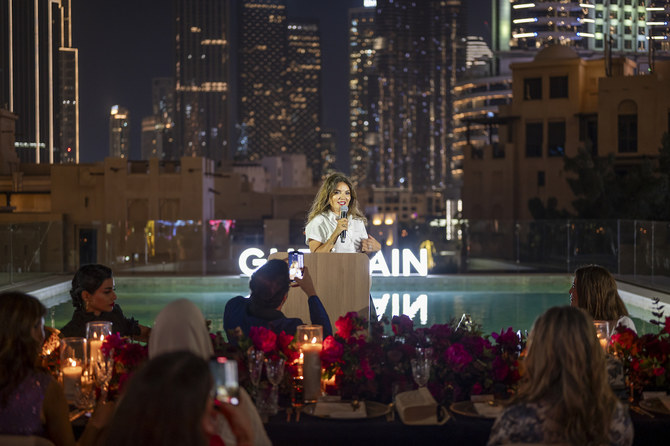
DUBAI: Ann-Caroline Prazan, the director of art, culture, and heritage at French luxury beauty brand Guerlain, shared her affection for the Middle East and shed light on why she is so keen to mesh together cultures when creating new products.
“The Guerlain family is totally in love with the region. I am in love with this region because it is like a paradise,” she told Arab News. “People here love fragrances and they are such experts. When Guerlain creates a fragrance for the Middle East, it is always with a French touch.”

For Prazan, who joined the Guerlain team in 2000, understanding the brand’s story has been pivotal, motivating her to craft fragrances over her 24-year tenure, prioritizing longevity over trends.
“It is important to understand the past to create a future,” Prazan said. “You know, a house is like a big tree. You need to know the roots to create the leaves and to create new flowers. Without roots, you cannot do anything if you do not understand the brand.”
“Innovation is our obsession,” she added. “Guerlain created the first lipsticks, the first lip liners, the first modern perfume, the first moisturizing Nivea cream was by Guerlain.”

Her regional knowledge shapes Guerlain’s tailored fragrances for its customers.
“You have the best perfumers here, local perfumers. What was interesting is to mix the roots with the leaves to mix different cultures. And for me, when you mix different cultures, when you mix traditions and modernity, you can create beautiful products,” she explained.
Guerlain has collaborated with regional creatives before. In 2023, the brand worked with Lebanese artist Nadine Kanso to design a fragrance bottle for the label, making her the first Arab designer to collaborate with the LVMH-owned perfume and beauty house.

She designed 30 limited edition bee-inspired bottles, decorated with 1,720 crystals, with Arabic calligraphy that read “Love.”
At an event in Dubai last week, the label chose to work with contemporary Tunisian artist Nja Mahdaoui, who showcased his abstract Arabic calligraphy with engraved Cherry Oud bottles serving as place cards for the invitees.
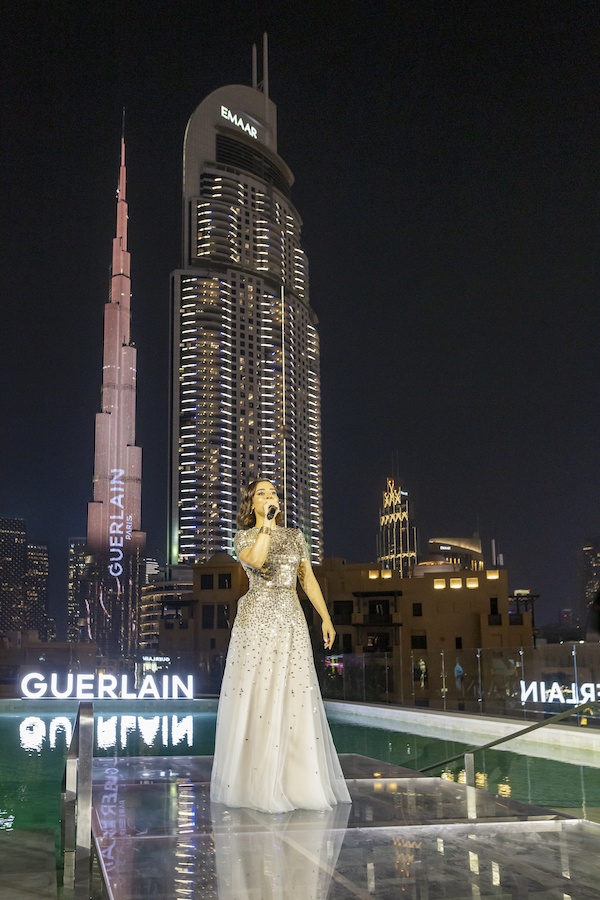
The brand also created a number of bottles, showcased at the event in Dubai, that celebrate Arab design elements.
The Parfumerie D’Art collection features the Bee Bottle by Baqué Molinié. Unveiled to mark Eid Al-Fitr this year, the bottle features hand-placed mother-of-pearl beads and moonstones, designed by the Parisian atelier as a tribute to the “wonders of Arab architectural art,” according to a released statement.
‘Bridgerton’ actress says she was warned not to campaign for Palestinians
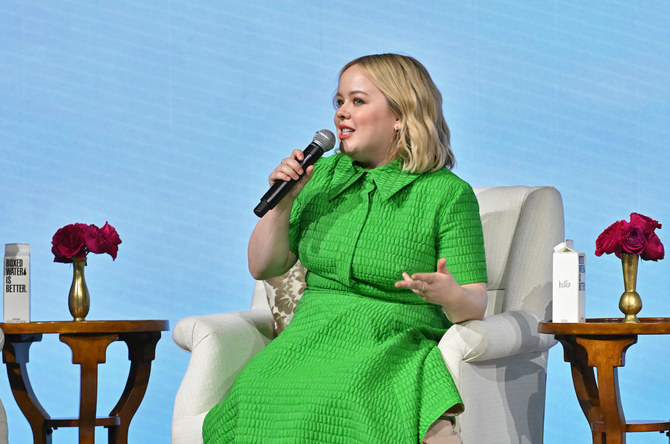
- Nicola Coughlan: Hollywood insiders told her advocacy could harm her career
- Irish star feels ‘moral responsibility’ to campaign for ceasefire, continue to fundraise
LONDON: Irish actress Nicola Coughlan has revealed that she was told her Palestinian advocacy could harm her career.
The “Bridgerton” and “Derry Girls” star told Teen Vogue she had been warned by people in Hollywood not to be openly supportive of Palestinian rights, but has continued to campaign for a ceasefire in Gaza and still publicly wears an Artists4Ceasefire pin.
“You do get told, ‘you won’t get work, you won’t do this,’ but I also think, deep down, if you know that you’re coming from a place of ‘I don’t want any innocent people to suffer,’ then I’m not worried about people’s reactions,” she said.
“My family lived in Jerusalem back in the late ‘70s, early ’80s, before I was born, so I heard first hand stories about them living there.”
She said her father, who served in the Irish military, went to a “lot of war-torn regions after the conflict and try and help rebuild,” and this had left a profound impression on her.
“I’m so lucky I’ve gotten to this point in my career, and I’m privileged as a white woman, first off.
“Then the fact that I get to do the job I love and travel the world and meet amazing people, I feel a moral responsibility to give back.”
She has made a point of continuing to campaign and raise money around the issue, adding: “To me, it always becomes about supporting all innocent people, which sounds oversimplified, but I think you’ve got to look at situations and just think, ‘Are we supporting innocent people no matter where they’re from, who they are?’ That’s my drive.”
Coughlan said social media plays a role in driving advocacy but it requires nuance. “More of us should be trying to understand how upsetting and traumatising this is for Jewish people, and how horrific it is that all these innocent people in Palestine are being murdered,” she added.
A number of Hollywood figures have faced repercussions for their open support of the Palestinians or criticism of Israel.
Mexican actress Melissa Barrera was fired from the latest “Scream” film over social media posts in support of Palestine, while director Jonathan Glazer caused controversy for using his acceptance speech at the Oscars for his film “The Zone of Interest” to criticize the Gaza war.
‘Game of Thrones’ star Liam Cunningham says world will ‘not forget’ those who stayed silent on Gaza
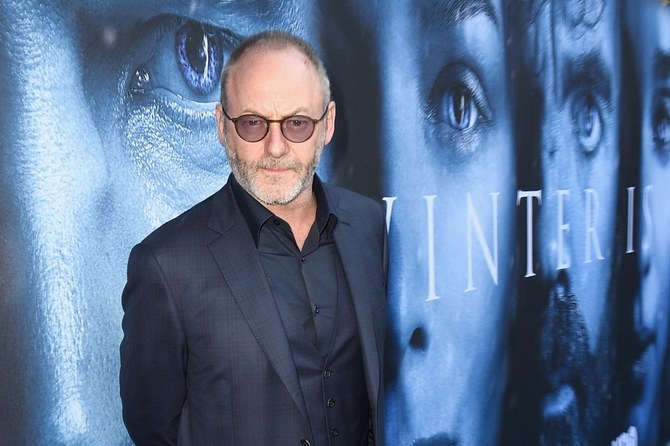
- Irishman has been vocal advocate for Palestinian causes for decades
LONDON: Irish actor Liam Cunningham has said the public will “not forget” those who have not voiced support for Palestinians during the ongoing Israel-Hamas conflict in Gaza.
The “Game of Thrones” star has been a vocal advocate for Palestinian causes for decades. Speaking during a demonstration in Dublin led by Irish-Palestinian Ahmed Alagha, who has lost 44 family members in the recent Israeli assault on Gaza, Cunningham said he has been commended by his peers in the past for his activism.
“What concerns me is that the people who do care and are not doing anything are, in my opinion, worse than the people who don’t care,” he said.
Cunningham was asked if he had spoken to other actors to convince them to show support for the Palestinian cause, but responded by saying he could not speak for others, The Independent reported.
However, he added, “The internet doesn’t forget. When this comes around, when the ICJ (International Court of Justice) and ICC (International Criminal Court) hopefully do their work honorably, it is going to come out,” he said.
“And the people who didn’t talk — it is not going to be forgotten. It’s livestreamed, this genocide, and (saying) you didn’t know is not an option. You did know. And you did nothing. You stayed quiet. I need to be able to look in the mirror, and that’s why I speak,” he added.
A month after Israel launched its onslaught on Gaza in response to Hamas incursions on Oct. 7 in Israeli territory in which nearly 1,200 people were killed and around 250 hostages were taken, Cunningham said that for Irish people to ignore the treatment of Palestinians would be to “betray” their history.
“If we allow ourselves to accept this behavior, then we allow it to happen to us,” he said at the time. “We have to stand up for standards. We have to stand up for international law and it reduces us as human beings if we don’t.”
Israel’s assault on Gaza has killed more than 34,000 Palestinians, around two-thirds of them children and women, according to Hamas-run health authorities in the enclave.



